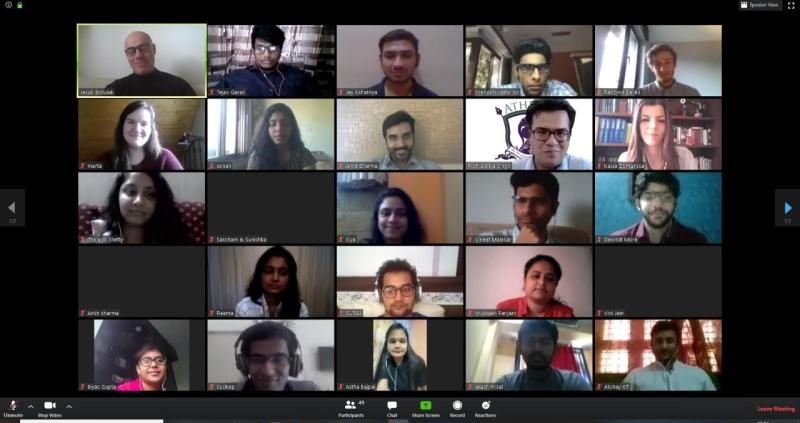The essence of the program is to create project teams consisting of students from both universities. All in all, it does not matter if they are undergraduate, graduate, or postgraduate students. It is important that as part of the implementation of their subjects they must complete some projects that require research. VP-RR enables the exchange of data and information between Poles and Indians. Thus, through the implementation of projects, it is possible for teams from two different cultures to cooperate, which leads to a better understanding of cultural backgrounds and diversity.
The project teams have up to 8 students - a maximum of four students from India and Poland. In this edition of the program, the initiating project was SGH - SGH students invited Indian students to implement projects by sending them a one-page invitation consisting of three sections: a brief description of the initiated project with a presentation of potential benefits for Indian students, a desirable roadmap with specific dates, short information about themselves often accompanied by a photo. Based on invitations, Athena students chose project groups. Then the students determine the final results of their projects, which must be approved by us. The results should in particular present research carried out by individual groups and be codified: in the form of a presentation or report. Finally, student feedback on the entire program will be collected and in the end, all students who delivered the results and gave feedback, get confirmation of participation – certificates signed by us with logos of our universities. We met the students twice - at the beginning of the program – on the kick-off meeting – when students have opportunity to see us and get familiar with our expectations and at the end of the program, where we pass on our feedback to students.
 Photo: one of the 11 invitations prepared by SGH for Athena students
Photo: one of the 11 invitations prepared by SGH for Athena students What are the key success factors? First, trust between us - we did not sign any formal contracts, we did not create the entire formal structure, we only agreed on the basis of a gentleman’s agreement that we want to do it. We met half a year ago in Krakow at the AACSB conference, where Jakub Brdulak proposed to Aditya Singh this type of cooperation formula. After the initial agreement, we met about three times on Skype and established a framework for collaboration. A necessary condition was to check whether the program would meet the interest of students - here the invaluable help was offered on SGH side by Warsaw School of Economic Students’ Union. All these interactions were based on trust. The second factor of success is the involvement of all stakeholders: students and professors. The program requires very strong attention to deadlines and requires quick responses, e.g. responding to emails. We and our students must be responsive. Thirdly, focusing on the positive sides of cooperation. Each cooperation is challenging, especially one that is implemented only online. Therefore, many things have the right to fail or will not go as expected. For this reason, we focus in this project not on problems, but on solutions, and we need to respond flexibly to various challenges.

The cooperation mechanism itself is quite open - you can run such programs at the level of individual courses - this type of program was implemented by Jakub Brdulak with SRH Hochschule Heidelberg from Germany in the 2018/2019 academic year or maximally open recruitment to the program, as is the case with the Athena School of Management. There is no need to dedicate specific tools for online work, because students organize themselves here - most groups have created groups on WhatsApp and thus communicate. There is also no need to dedicate any financial resources to implement such cooperation - at the level of individual project teams there are no costs, although the program requires more than standard work on our part. But the amount of work put in by students is larger than standard too.
So, we encourage universities to introduce such solutions - two engaged lecturers are enough, and students, which results from our experience should be found. It is a fun adventure for all parties, which is especially valuable in these difficult-pandemic times.
Athena School of Management (AACSB, AMBA (BGA), UNGC) is the Best Emerging Business School in India located in Mumbai. Athena is known for focusing on Experiential Learning, Multiple Internships & Global Exposure for its students. Athena programs have Entrepreneurship, International Business and Innovation as core modules. Athena is India’s most Global B-School with collaborations with leading Institutions across Europe, North America, Asia & Africa. To know more please visit: www.athenaschoolofmanagement.com
SGH Warsaw School of Economics, (CEEMAN, AMBA, CEMS) is the oldest university of economics in Poland. Its mission has continuously been educating economists and business leaders serving the nation, country, and the region. SGH is famous for its tradition, flexible adjustments of programs to students’ needs, unquestionable education level, and successful alumni. To know more please visit:
www.sgh.waw.pl/en/Pages/ Jakub Brdulak, SGH Professor, https://www.linkedin.com/in/brdulak/
Aditya Singh, Professor & Director – Athena, https://www.linkedin.com/in/adityasinghforge/